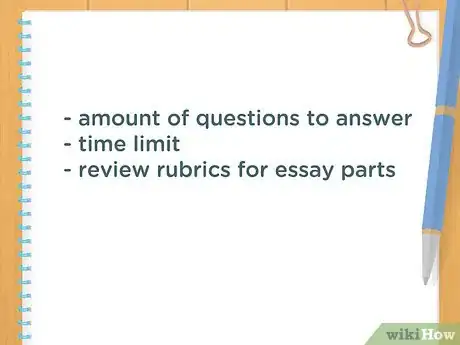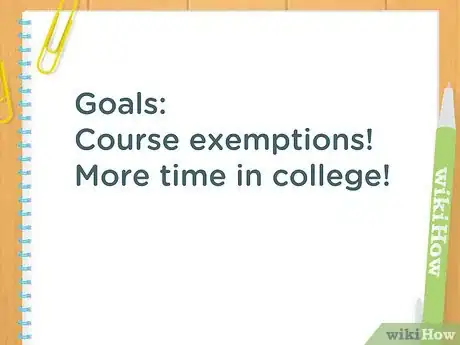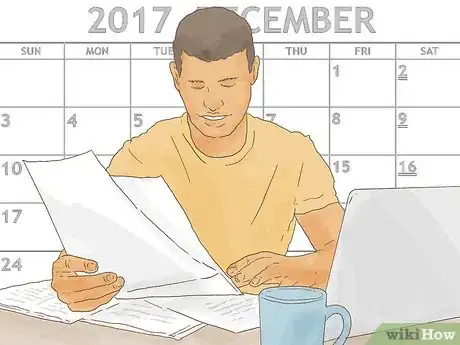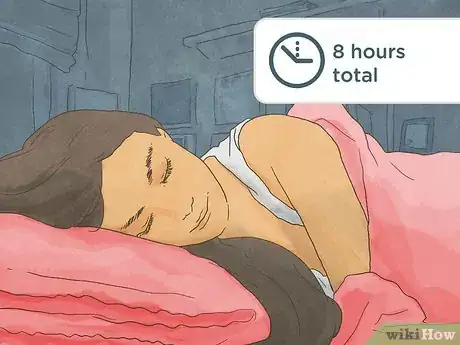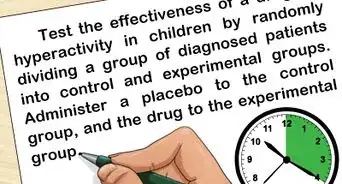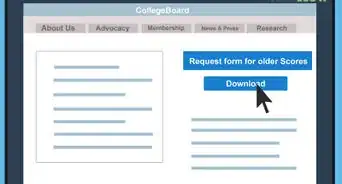This article was co-authored by Christopher Taylor, PhD. Christopher Taylor is an Adjunct Assistant Professor of English at Austin Community College in Texas. He received his PhD in English Literature and Medieval Studies from the University of Texas at Austin in 2014.
There are 7 references cited in this article, which can be found at the bottom of the page.
This article has been viewed 64,874 times.
It's that time of year again: as May rolls around, many high school students around the country immerse themselves in fat test prep books and replenish their coffee stock to survive the stressful AP testing season. Earning a score of 3 or higher may exempt you from taking similar courses from college, so you'll want to do the best you can on these advanced examinations. Start early and stay focused.
Steps
Studying for the Exam
-
1Stay on track in your coursework. AP exams require mastery of lots of material, too much information to cram at one time. The AP courses you are enrolled in are designed to prepare you for the exam, so take the classwork and homework seriously. Pay attention, take notes, review on your own time, and take the time to memorize material.
- You can take an AP exam without taking the course, but an AP course is always the best preparation.[1]
-
2Buy AP test preparation books. These often summarize the material in a succinct way and offer plenty of opportunities for practice. Take a diagnostic test and review the material you seem to have trouble with the most.[2]
- Many companies produce test prep books. If you want additional study materials, buy books from different companies. Although most companies produce new books every year, they largely replicate the material from the preceding year, so buying multiple editions of the same book will do you little good.
Advertisement -
3Take practice exams. The College Board has free questions on its website and practice books are replete with test questions. Try as much as possible to replicate actual test conditions by timing yourself and performing the test in a quiet environment.
-
4Find a tutor or enroll in prep classes. With one-on-one instruction, the tutor is more likely to be able to help you understand the material or focus on your weaknesses than a teacher in a large course. This can be better than studying on your own because you a tutor can notice and correct mistakes as well as objectively evaluate your tests.
-
5Write practice essays. With practice, it becomes easier to write under the time constraints imposed by the AP test. It is also important to get a good sense of your pacing. You don’t want to go on so long on a particular subject that you can’t finish. Get a sense of your limitations so that you know when to wrap things up on your exam.
- Try to find another student, a tutor, or a parent who is willing to read your essay and help correct mistakes. It can be difficult to objectively evaluate your own work.
- Remember, it isn’t imperative to discuss all of the documents on Document Based Questions. Doing so, might, in fact, make your paper disorganized and cost you valuable time. Familiarize yourself with how many documents you are expected to discuss and stick to that number.[3]
-
6Understand the structure of the exam. To avoid unnecessary stress, be sure that you are familiar with the structure of the test. Know how many questions you need to answer and how much time you have for each. Review the rubrics for the essays. Understand the procedure on test day.[4]
- For each of the essay assignments, there is a rubric that explains exactly how the grader evaluates the essay. You might be required to cite a specific number of documents or a particular number of countries. Be prepared for this in advance.
- Research where and at what time the test will be given to be sure that you can arrive well in advance. You will be given a barcode upon arrival to identify your test. Familiarizing yourself with these details can eliminate test day stress.[5]
-
7Find your motivation. Remind yourself how much you want to do well--write out your goals and post them somewhere on your desk you can easily see. Remember, AP exams can be a huge asset for getting into college and freeing up time to focus on the subjects you care about during your undergraduate years.
- Beware of distractions like YouTube or Facebook. Do not fall prey to procrastination.
Creating a Study Schedule
-
1Start studying over the summer. It is important that you don’t get too rusty over the summer, especially if the subject is something like math that builds on itself from year to year. Review the fundamentals that you have learned. You should even consider getting ahead on your work for the following year.[6]
- It might seem impossible to start studying for a course you haven’t begun to take yet, but there are some ways to do it. You can buy a test preparation book and study it or you can work with a tutor.
-
2Keep up to date. Until December, you should devote a little bit of time every week to a bit of studying on top of your assigned coursework. This is important to make sure that you are staying on track with your current material.[7]
-
3Review over Christmas. Use the free time you have over Christmas break to review what you have done so far. You will spend much of your time during the spring learning new material so it is important to make sure that you have mastered everything so far. Use this time to catch up on anything you had trouble with.[8]
-
4Study together in spring. By the springtime, it is important that you are seriously testing your skills. One good way to do this is to work in groups with other students who can correct you when you make mistakes or otherwise force you to the next level. Alternatively, take diagnostic exams to determine what areas you need to focus on.[9]
- In an AP class, you should ideally be with other intelligent and motivated students who can help you.
-
5Cram in April. Take practice tests to assess where you are and what you need to work on. Try to replicate real testing conditions so that you are comfortable on exam day. Create a schedule that will allow you to review all of the topics you have trouble with.[10]
-
6Finish up in May. Spend May working on the topics that you were still having trouble after your April cram session. Go back and review these topics. Don’t study up to the last second though; be sure to get rest.[11]
Taking the Exam
-
1Rest. Sleep has a huge effect on your intelligence. Unfortunately, it can be difficult to rest when you are worried about taking a test the following day. Because of that, it is imperative that you rest well the day before and try to get a lot of sleep the week of. Try to get eight hours a night.
- Electronics can keep you up at night. Turn them off at least an hour before you go to bed.
- Try to exercise frequently. This will help you focus when you study and fall asleep when you need to.[12]
- Do not fall for the temptation to cram the night before. This will be counterproductive.
-
2Eat a hearty breakfast. You will need a big breakfast with lots of protein to give yourself the energy to make it through the test. Eggs, bacon, yogurt, nuts, and milk are appropriate. Avoid sugars, like candy, chocolate, and desserts. These will cause you to crash.
-
3Answer every question. Unlike on the SAT, you will not be penalized for answering a question incorrectly. Even if you do not know the answer to the question, you have an incentive to guess. If you are stuck on a question, guess and move on so that you get to the other questions.[13]
- If you are spending too much time on a question, take your best guess and mark the question on your scrap paper. That way, if you have time at the end of test, you will know where to go back and take a look.
-
4Don’t dump information on the essays. While the essays are a great way to demonstrate your knowledge of the subject, they aren’t intended as an info dump. You will need a clearly defined thesis and information that doesn’t support your argument does not belong in the essay. Discussing irrelevant information will cost you valuable time and will not look good to the readers.[14]
-
5Don’t stress. Stress can be counterproductive. A 3 won’t hurt your chances at college, it just won’t help as much as a 5. Furthermore, you can retake the AP exam as often as you like, so if something unfortunate happens on test day, you will have an opportunity to make up for your mistakes.[15]
Community Q&A
-
QuestionAre points deducted for incorrect answers on AP exams?
 Christopher Taylor, PhDChristopher Taylor is an Adjunct Assistant Professor of English at Austin Community College in Texas. He received his PhD in English Literature and Medieval Studies from the University of Texas at Austin in 2014.
Christopher Taylor, PhDChristopher Taylor is an Adjunct Assistant Professor of English at Austin Community College in Texas. He received his PhD in English Literature and Medieval Studies from the University of Texas at Austin in 2014.
English Professor No, they are not. There is no longer any penalty for guessing or missing answers on AP exams.
No, they are not. There is no longer any penalty for guessing or missing answers on AP exams. -
QuestionHow do I study for AP exams?
 Christopher Taylor, PhDChristopher Taylor is an Adjunct Assistant Professor of English at Austin Community College in Texas. He received his PhD in English Literature and Medieval Studies from the University of Texas at Austin in 2014.
Christopher Taylor, PhDChristopher Taylor is an Adjunct Assistant Professor of English at Austin Community College in Texas. He received his PhD in English Literature and Medieval Studies from the University of Texas at Austin in 2014.
English Professor Familiarize yourself with the content and structure of the particular AP test you are taking. As you work through practice tests, pay attention to any patterns you see in terms of what information you need to know as well as how the questions/sections are structured. Then use these insights to help you tweak the way you are studying.
Familiarize yourself with the content and structure of the particular AP test you are taking. As you work through practice tests, pay attention to any patterns you see in terms of what information you need to know as well as how the questions/sections are structured. Then use these insights to help you tweak the way you are studying. -
QuestionCan you take an AP exam without taking the course?
 Christopher Taylor, PhDChristopher Taylor is an Adjunct Assistant Professor of English at Austin Community College in Texas. He received his PhD in English Literature and Medieval Studies from the University of Texas at Austin in 2014.
Christopher Taylor, PhDChristopher Taylor is an Adjunct Assistant Professor of English at Austin Community College in Texas. He received his PhD in English Literature and Medieval Studies from the University of Texas at Austin in 2014.
English Professor Yes, you can take an AP exam without taking the corresponding course. If you choose to go this route, the College Board recommends purchasing a study book for that course so that you can familiarize yourself with the structure and content of the exam.
Yes, you can take an AP exam without taking the corresponding course. If you choose to go this route, the College Board recommends purchasing a study book for that course so that you can familiarize yourself with the structure and content of the exam.
Warnings
- Never attempt to cheat on your exams. If you are caught cheating on any AP exam, all of your results will be discarded, and everybody else in your group who worked very hard for the exams may lose their results too.⧼thumbs_response⧽
- Don't forget to bring your ID card and other necessary materials on test day.⧼thumbs_response⧽
References
- ↑ http://www.huffingtonpost.com/2013/05/16/5-things-you-need-to-know_0_n_3286770.html
- ↑ https://www.ivywise.com/ivywise-knowledgebase/newsletter/article/tips-to-prepare-for-ap-exams/
- ↑ http://www.usnews.com/education/blogs/college-admissions-playbook/2014/03/03/follow-3-study-tips-to-prepare-for-the-ap-history-exam
- ↑ http://www.usnews.com/education/blogs/college-admissions-playbook/2014/03/03/follow-3-study-tips-to-prepare-for-the-ap-history-exam
- ↑ and at what time
- ↑ https://www.teenlife.com/blogs/how-study-advanced-placement-ap-exams
- ↑ https://www.teenlife.com/blogs/how-study-advanced-placement-ap-exams
- ↑ https://www.teenlife.com/blogs/how-study-advanced-placement-ap-exams
- ↑ https://www.teenlife.com/blogs/how-study-advanced-placement-ap-exams
- ↑ https://www.teenlife.com/blogs/how-study-advanced-placement-ap-exams
- ↑ https://www.teenlife.com/blogs/how-study-advanced-placement-ap-exams
- ↑ http://www.huffingtonpost.com/dr-robert-oexman/all-nighters_b_1501263.html
- ↑ http://www.usnews.com/education/blogs/college-admissions-playbook/2014/03/03/follow-3-study-tips-to-prepare-for-the-ap-history-exam
- ↑ http://www.usnews.com/education/blogs/college-admissions-playbook/2014/03/03/follow-3-study-tips-to-prepare-for-the-ap-history-exam
- ↑ https://www.ivywise.com/ivywise-knowledgebase/newsletter/article/tips-to-prepare-for-ap-exams/





